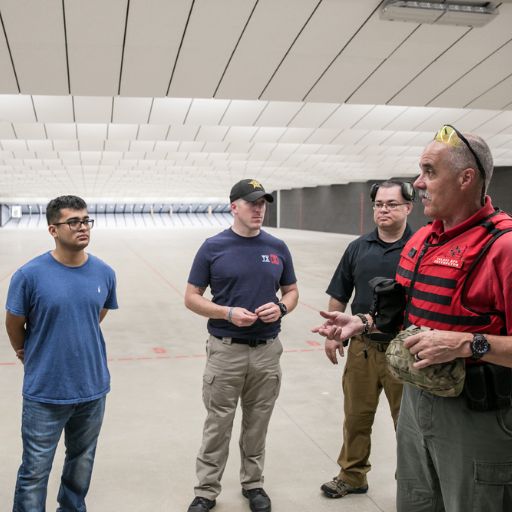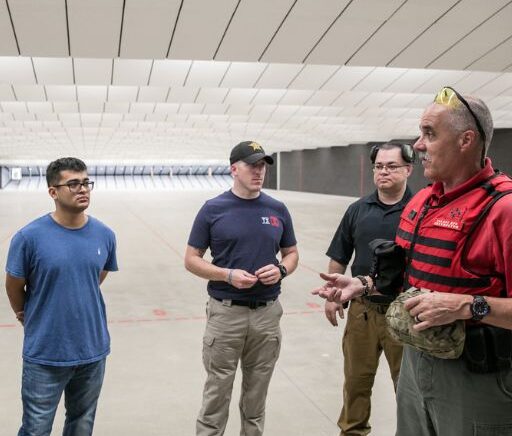An associate degree in criminal justice is a more versatile degree than students realize. Although many people assume that criminal justice is aimed at training students to become police officers, this degree field goes far beyond just catching the bad guys. In fact, a criminal justice degree program encompasses history, law, science, government, and sociology, as well as police procedures, criminal law, and court processes.
Find out how a criminal justice associate degree can support a career in law enforcement, law, social services, and more.
In this Article
What Is Criminal Justice?
The study of criminal justice covers the laws, processes, and agencies that define criminal behavior. The criminal justice system includes law enforcement, the courts, corrections, social services agencies, and public safety. The goals of the criminal justice system include:
- Prevent crime, solve crimes, and bring criminals to justice through the court system.
- Hold lawbreakers accountable through jail, prison, or community service.
- Help offenders rehabilitate so they don’t go back to committing crimes.
The criminal justice system is complex and difficult to navigate. Everyone working inside the system must have extensive knowledge of the laws that govern their actions as well as an understanding of human nature and psychology.
Law enforcement officers must know the legal system, their rights and responsibilities, and suspects’ rights. They must investigate crimes, gather evidence, conduct interrogations, and make arrests within the constraints of the justice system.
Defense attorneys, prosecutors, and judges must understand how law enforcement works. Defense attorneys must make sure that their clients’ rights have been protected during the investigation. Prosecutors must ensure that all police procedures were carried out lawfully, or their case could be thrown out.
Substance abuse counselors, juvenile justice advocates, social workers, and parole and probation officers need to understand how to help their clients become rehabilitated. They have to work within the criminal justice system and with social services to get their clients the resources they may need, whether that is addiction treatment, job training, housing, or other needs.
Criminal Justice Associate Degree Program
ACC’s criminal justice associate degree program is generally a two-year program, if students go to school full-time (about 4 classes per semester). It includes foundational courses in writing, communications, history, government, and sciences. It also coverx introductory classes in criminal justice, the court system, criminal law, and corrections.
The focus of an associate degree program is twofold: to prepare students to become law enforcement officers and enter the workforce or prepare to transfer to a four-year institution for a bachelor degree.
Here’s how it works.
How to Become a Police Officer
In order to be certified as a law enforcement officer, students usually must have an associate degree (or higher) before they can enroll in a police training program, or academy.

Major city police departments often operate their own police academies, where cadets get paid to train.
However, small cities and towns rely on police academies that are operated by a community college such as Austin Community College. ACC estimates that more than 700 law enforcement officers in Central Texas trained at the ACC Hays Campus Public Safety Training Center.
With a criminal justice associate degree, prospective students are eligible to enter the Texas Peace Officer Sequence Certification.
This two-semester certification course consists of four courses. These classes cover police procedures such as criminal investigations, police practices, fundamentals of criminal law, and juvenile justice. It also includes a skills component, and provides training in firearms, defensive tactics, driving, and more.
At the end of the program, students have a capstone project that prepares them for the Texas Commission on Law Enforcement (TCOLE) exam.
Once cadets pass the exam they are eligible to become law enforcement officers in Texas.
Associate Degree to Bachelor’s Degree in Criminal Justice
Students who want to continue their education can transfer their associate of arts degree to a four-year university. The ACC AA in Criminal Justice seamlessly transfers to Texas State University and many other universities in Texas.
For many students, a bachelor’s in criminal justice can be a springboard for a career in law, social work, social services, or similar path. A bachelor’s degree in criminal justice can also position law enforcement professionals for promotion, if they aspire to a leadership role in a police or sheriff’s department.
Criminal Justice Skills
Whether you have always dreamed of going into law enforcement, juvenile justice, law, or other career path, a criminal justice degree will prepare you with the necessary technical and interpersonal skills you’ll need. Interpersonal, or soft skills as they are often called, are as important as job-specific hard skills.
Hard Skills
Written and verbal communication. Writing reports and speaking clearly with peers, members of the community, and supervisors is a necessary part of any job. It’s even more important for police, lawyers, judges, victim advocates and other criminal justice roles, as unclear communication could have dire consequences.
Criminal law. An associate degree in criminal justice will provide students with a foundation in criminal law.
Court procedures. Understanding what happens in the courtroom is important for everyone in the criminal justice system.
Police procedures and policies. Even students who don’t intend to go into law enforcement should have a basic understanding of how police departments work within the criminal justice system.
The following specific hard skills are specific to law enforcement officers and crime scene investigators:
- Firearms handling
- Crime scene analysis
- Investigation techniques
- Observational skills
Soft Skills
It’s just as important to have strong interpersonal skills as technical skills in a criminal justice job. Here are some of the top soft skills to work on.
Conflict management and de-escalation. Criminal justice is a high-stress field. Being able to deal with conflict and help people regulate their actions can help keep partners and civilians safe.
Critical thinking and problem-solving. Critical thinking requires the ability to analyze and sort through information and use your education and judgment to come to a solution.
Ethics. All careers in criminal justice require a strong sense of ethics and a commitment to ethical behavior. Ethics may go above and beyond legal definitions and take into account the well-being of others besides yourself.
Empathy. Perhaps the most important soft skill is empathy, or understanding another person’s point of view. Having compassion for people who you meet at their worst can be one of the most difficult parts of a criminal justice job.
Work well under pressure. Criminal justice careers are high-pressure and intense. Staying calm and regulating your emotions is key to being successful in this field.
Teamwork. Whether you’re a beat cop with a partner or working in a law office with paralegals, investigators, and analysts, a career in criminal justice requires the ability to work with others to solve cases and bring criminals to justice.
Entry-Level Jobs with a Criminal Justice Associate Degree
After you get your criminal justice associate degree, what next? Here are some career paths to follow.
Law Enforcement
With an associate degree, you are eligible for the peace office training that ACC provides. Once you go through training and pass the TCOLE, you are ready to be a law enforcement officer in Texas. Salaries for rookie law enforcement officers vary by agency; large cities generally pay more than small towns and counties. According to the Texas Commission on Law Enforcement, the pay ranges between $20,000-$65,000 for first-year law enforcement officers in Central Texas.
Bailiff
Bailiffs maintain order in courtrooms. As law enforcement officers they also must go through academy training. According to the Bureau of Labor Statistics (BLS), median annual pay is $53,040 for bailiffs.
Paralegal
Paralegals work for law firms and government agencies and conduct research, draft documents, and perform administrative tasks. Entry-level wage for a paralegal in Texas is around $19 per hour, according to salary and job site Indeed. The overall median wage for paralegals in Texas is $30.64 per hour, per BLS.
Juvenile Justice Officer
Juvenile justice officers work with young adults and children who have entered the criminal justice system. They may work in corrections or probation. Entry-level salaries for juvenile justice officers in the Texas Juvenile Justice-OIG is around $44,904, according to TCOLE.
Probation Officer
Probation and parole officers work with criminal offenders to help them rehabilitate and re-enter society. They make sure that probationers and parolees are following the requirements of their probation by meeting housing and working conditions of their probation. The mean salary in Texas is $50,510 for probation officers, according to the BLS.
Put Your Degree in Criminal Justice to Good Use
Earn your associate degree in criminal justice and serve your community. Whether you plan to go directly into law enforcement or want to transfer to a university to get a bachelor’s degree, this degree is the first step in meeting your career goals. Learn more about the Austin Community College criminal justice degree program and explore the ACC Public Safety Training Center and get started on your career plans today.
Back to Top

